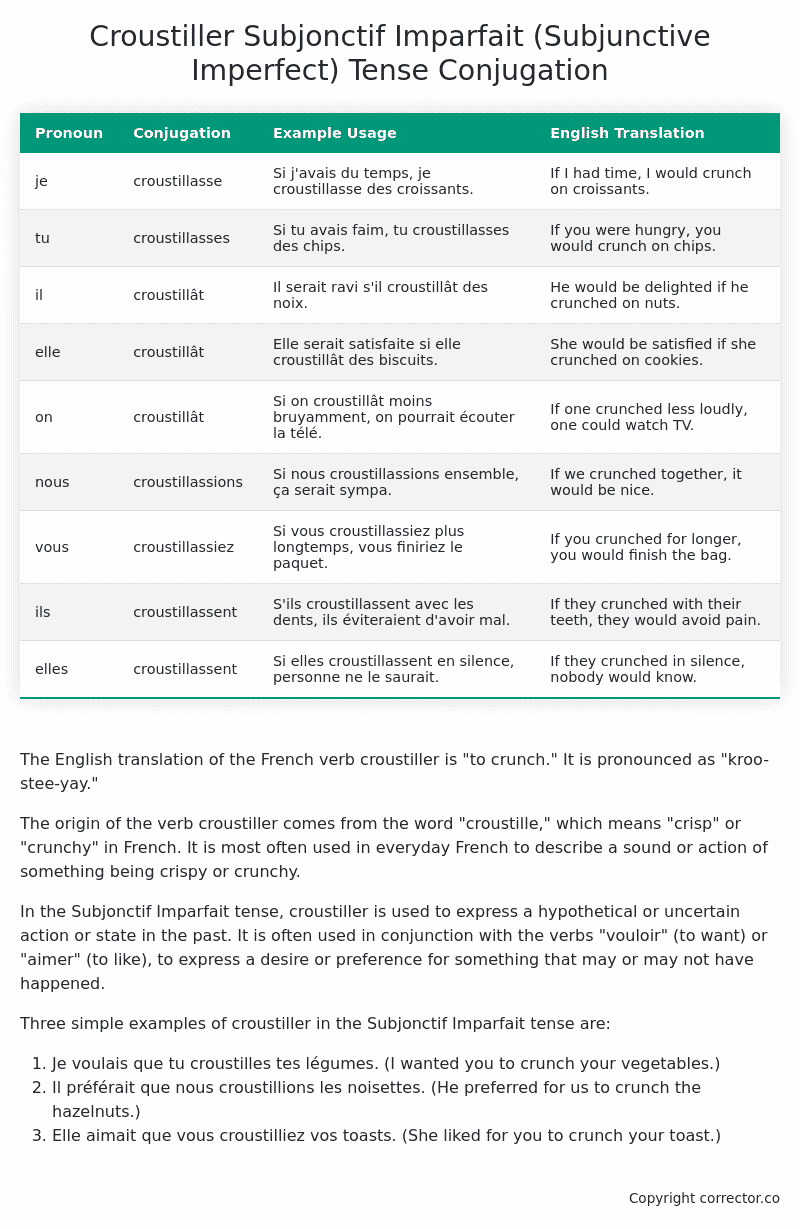Subjonctif Imparfait (Subjunctive Imperfect) Tense Conjugation of the French Verb croustiller
Introduction to the verb croustiller
The English translation of the French verb croustiller is “to crunch.” It is pronounced as “kroo-stee-yay.”
The origin of the verb croustiller comes from the word “croustille,” which means “crisp” or “crunchy” in French. It is most often used in everyday French to describe a sound or action of something being crispy or crunchy.
In the Subjonctif Imparfait tense, croustiller is used to express a hypothetical or uncertain action or state in the past. It is often used in conjunction with the verbs “vouloir” (to want) or “aimer” (to like), to express a desire or preference for something that may or may not have happened.
Three simple examples of croustiller in the Subjonctif Imparfait tense are:
- Je voulais que tu croustilles tes légumes. (I wanted you to crunch your vegetables.)
- Il préférait que nous croustillions les noisettes. (He preferred for us to crunch the hazelnuts.)
- Elle aimait que vous croustilliez vos toasts. (She liked for you to crunch your toast.)
Table of the Subjonctif Imparfait (Subjunctive Imperfect) Tense Conjugation of croustiller
| Pronoun | Conjugation | Example Usage | English Translation |
|---|---|---|---|
| je | croustillasse | Si j’avais du temps, je croustillasse des croissants. | If I had time, I would crunch on croissants. |
| tu | croustillasses | Si tu avais faim, tu croustillasses des chips. | If you were hungry, you would crunch on chips. |
| il | croustillât | Il serait ravi s’il croustillât des noix. | He would be delighted if he crunched on nuts. |
| elle | croustillât | Elle serait satisfaite si elle croustillât des biscuits. | She would be satisfied if she crunched on cookies. |
| on | croustillât | Si on croustillât moins bruyamment, on pourrait écouter la télé. | If one crunched less loudly, one could watch TV. |
| nous | croustillassions | Si nous croustillassions ensemble, ça serait sympa. | If we crunched together, it would be nice. |
| vous | croustillassiez | Si vous croustillassiez plus longtemps, vous finiriez le paquet. | If you crunched for longer, you would finish the bag. |
| ils | croustillassent | S’ils croustillassent avec les dents, ils éviteraient d’avoir mal. | If they crunched with their teeth, they would avoid pain. |
| elles | croustillassent | Si elles croustillassent en silence, personne ne le saurait. | If they crunched in silence, nobody would know. |
Other Conjugations for Croustiller.
Le Present (Present Tense) Conjugation of the French Verb croustiller
Imparfait (Imperfect) Tense Conjugation of the French Verb croustiller
Passé Simple (Simple Past) Tense Conjugation of the French Verb croustiller
Passé Composé (Present Perfect) Tense Conjugation of the French Verb croustiller
Futur Simple (Simple Future) Tense Conjugation of the French Verb croustiller
Futur Proche (Near Future) Tense Conjugation of the French Verb croustiller
Plus-que-parfait (Pluperfect) Tense Conjugation of the French Verb croustiller
Passé Antérieur (Past Anterior) Tense Conjugation of the French Verb croustiller
Futur Antérieur (Future Anterior) Tense Conjugation of the French Verb croustiller
Subjonctif Présent (Subjunctive Present) Tense Conjugation of the French Verb croustiller
Subjonctif Passé (Subjunctive Past) Tense Conjugation of the French Verb croustiller
Subjonctif Imparfait (Subjunctive Imperfect) Tense Conjugation of the French Verb croustiller (this article)
Conditionnel Présent (Conditional Present) Tense Conjugation of the French Verb croustiller
Conditionnel Passé (Conditional Past) Tense Conjugation of the French Verb croustiller
L’impératif Présent (Imperative Present) Tense Conjugation of the French Verb croustiller
L’infinitif Présent (Infinitive Present) Tense Conjugation of the French Verb croustiller
Struggling with French verbs or the language in general? Why not use our free French Grammar Checker – no registration required!
Get a FREE Download Study Sheet of this Conjugation 🔥
Simply right click the image below, click “save image” and get your free reference for the croustiller Subjonctif Imparfait tense conjugation!

Croustiller – About the French Subjonctif Imparfait (Subjunctive Imperfect) Tense
Formation
Common Everyday Usage Patterns
Interactions with Other Tenses
Subjonctif Présent
Indicatif Passé Composé
Conditional
Conditional Perfect
Summary
I hope you enjoyed this article on the verb croustiller. Still in a learning mood? Check out another TOTALLY random French verb conjugation!


